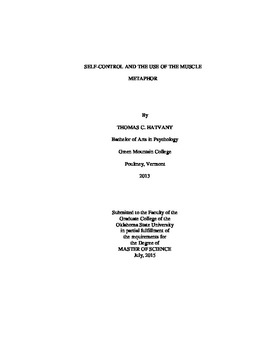| dc.contributor.advisor | Burkley, Edward | |
| dc.contributor.author | Hatvany, Thomas Charles | |
| dc.date.accessioned | 2016-09-29T18:40:22Z | |
| dc.date.available | 2016-09-29T18:40:22Z | |
| dc.date.issued | 2015-07-01 | |
| dc.identifier.uri | https://hdl.handle.net/11244/45263 | |
| dc.description.abstract | Metaphors are helpful cognitive tools that people use every day to make sense of abstract concepts. Previous research has shown that use of certain metaphors can affect attitudes and cognitions by providing greater understanding of these abstract concepts through priming a framework for these thought processes. One abstract concept that metaphors may help us understand is self-control, which can be described to function like a muscle. The present research examined the impact of priming the metaphor of self-control as a muscle on self-control performance. Additionally, this study examined if individuals differences in Personal Need for Structure (PNS) moderated the effect on self-control performance. Results indicated that priming of the muscle metaphor had no effect on self-control performance and did not interact with PNS. | |
| dc.format | application/pdf | |
| dc.language | en_US | |
| dc.rights | Copyright is held by the author who has granted the Oklahoma State University Library the non-exclusive right to share this material in its institutional repository. Contact Digital Library Services at lib-dls@okstate.edu or 405-744-9161 for the permission policy on the use, reproduction or distribution of this material. | |
| dc.title | Self-control and the Use of the Muscle Metaphor | |
| dc.type | text | |
| dc.contributor.committeeMember | Burkley, Melissa | |
| dc.contributor.committeeMember | Lukaszewski, Aaron | |
| osu.filename | Hatvany_okstate_0664M_14115.pdf | |
| osu.accesstype | Open Access | |
| dc.description.department | Psychology | |
| dc.type.genre | Thesis | |
